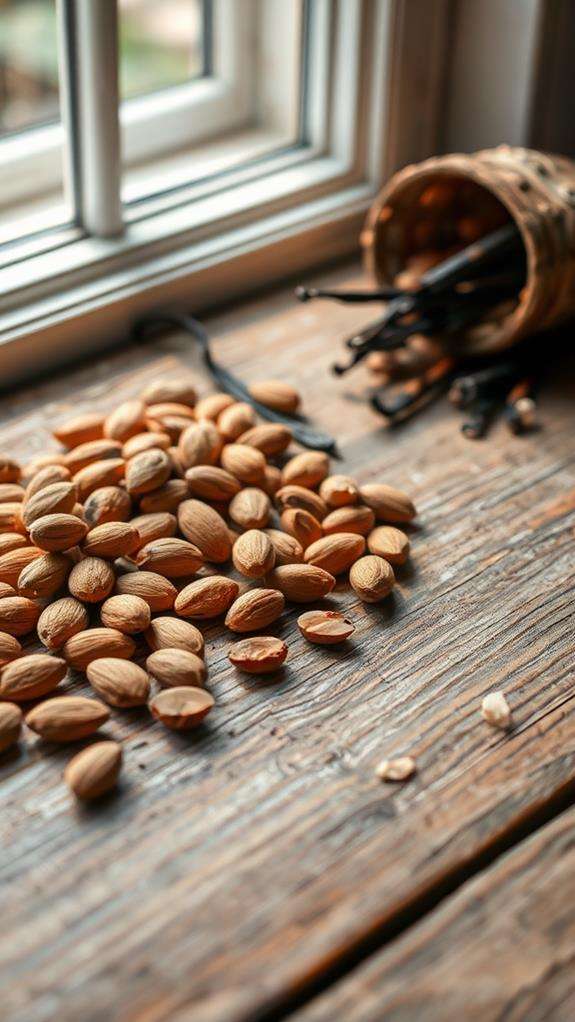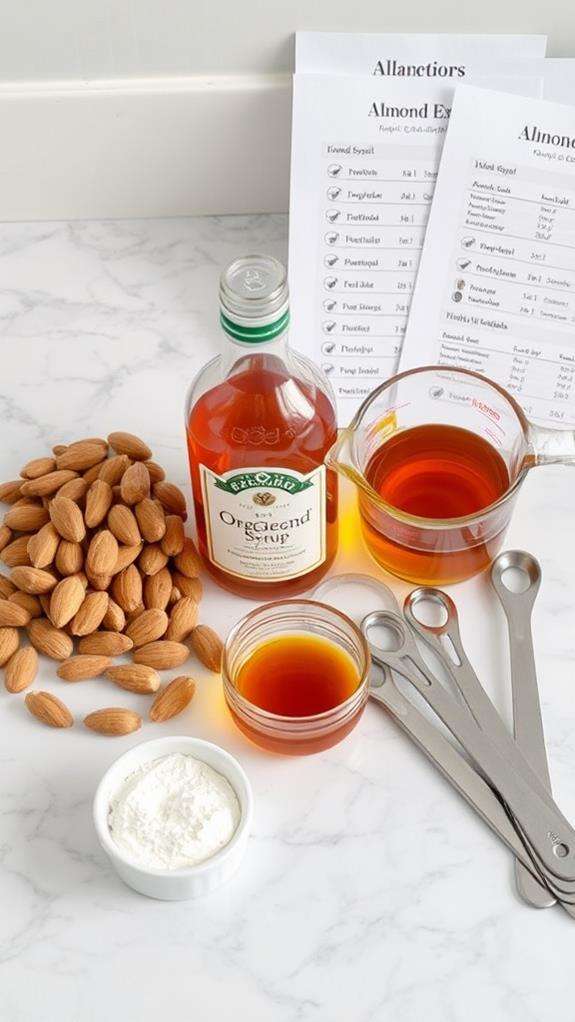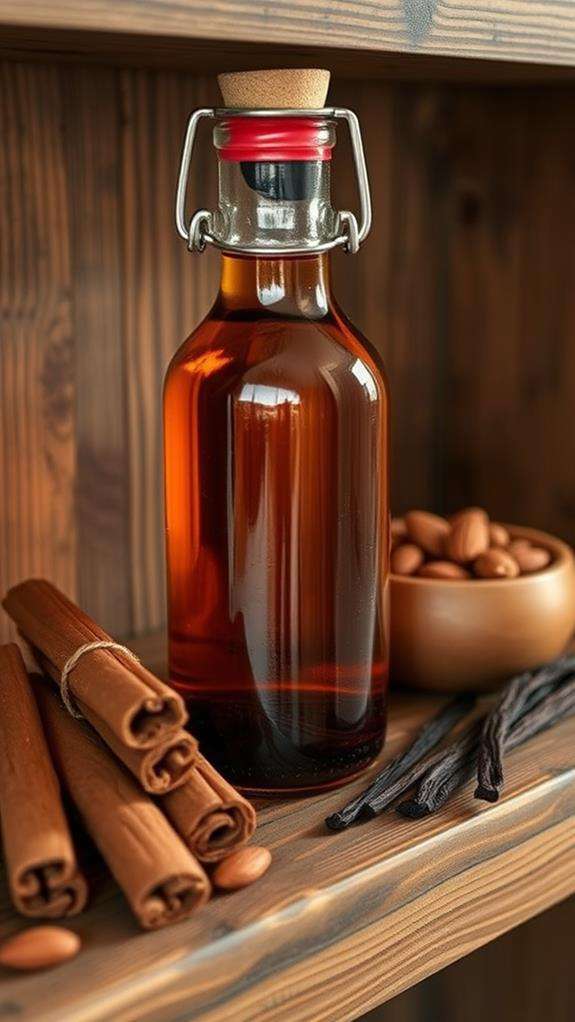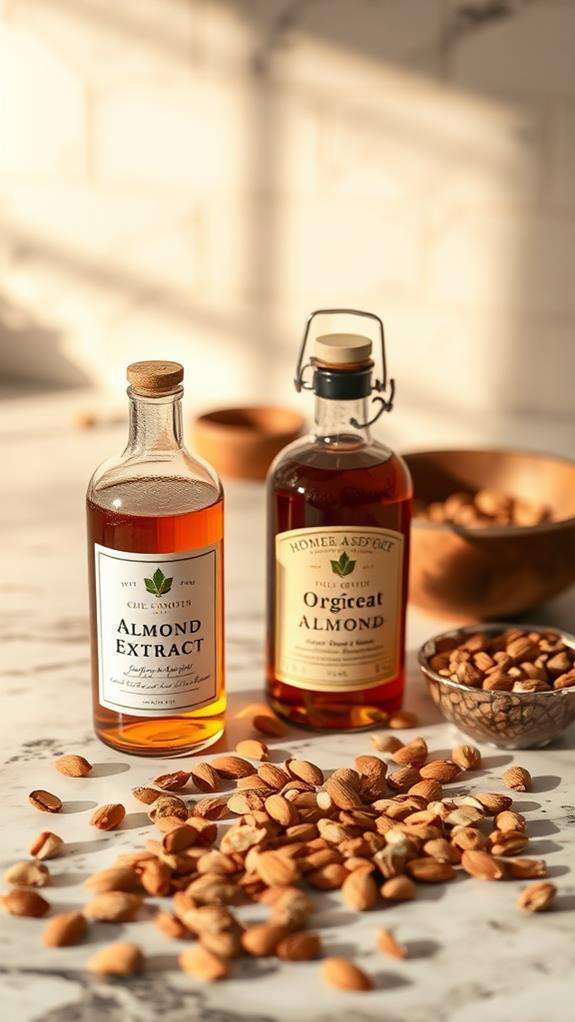Substitute for Amaretto
You can substitute amaretto with several effective alternatives depending on your needs. For non-alcoholic options, use almond extract (1/4 teaspoon per tablespoon of amaretto), orgeat syrup (1:1 ratio), or almond syrup. If you're making cocktails or baking, Frangelico (hazelnut liqueur) or Disaronno work well as alcoholic replacements. For a quick homemade version, combine almond extract with vanilla extract in a 2:1 ratio. When baking, almond emulsion provides better stability at high temperatures than extract. Remember to start with smaller amounts and adjust to taste, as some substitutes, especially almond extract, are highly concentrated. Understanding proper measurement conversions will help you master these alternatives.
This post may contain affiliate links. If you make a purchase through these links, I may earn a commission at no additional cost to you. Additionally, portions of this post may be generated using artificial intelligence (AI) technology. While we strive for accuracy, please be aware that AI-generated content may not always be perfect and should be fact-checked when necessary.
The Spatula Scoops
- Almond extract is the most concentrated substitute, using 1/4 teaspoon per tablespoon of amaretto in recipes.
- Orgeat syrup provides a 1:1 non-alcoholic replacement with similar nutty and floral notes.
- Frangelico (hazelnut liqueur) offers a comparable alcoholic alternative with 20% ABV and nutty flavor profile.
- Mix almond and vanilla extracts in a 2:1 ratio to create a custom syrup that mimics amaretto's flavor.
- Almond syrup serves as a straightforward substitute in coffee drinks and desserts with similar sweetness levels.
Understanding Amaretto's Core Flavors

The essence of amaretto lies in its complex symphony of flavors. When you're looking to understand this Italian liqueur, you'll need to recognize its distinctive almond flavor profile, which comes from either apricot kernels or actual almonds. The nutty flavor forms the foundation of amaretto's character, but it's far from a one-note experience.
You'll find that amaretto taste encompasses multiple layers, starting with that signature bittersweet almond note and expanding into warm, brown-sugar undertones. The alcohol content, typically ranging from 21% to 28% ABV, contributes to the liqueur's overall sweetness while carrying subtle vanilla accents throughout each sip. You'll also detect gentle hints of cherry or peach, depending on the specific brand you're sampling.
Understanding these core elements is essential when you're seeking a substitute, as the ideal replacement should mirror this intricate flavor composition. Different brands of amaretto liqueur may incorporate various spices or additional ingredients, but the fundamental characteristics remain consistent: sweet, nutty, and slightly bitter, with a smooth, rich mouthfeel that makes it so versatile in both cocktails and cooking.
Top Non-Alcoholic Replacement Options

When you're looking for non-alcoholic alternatives to amaretto, you'll find several kitchen-ready options that can effectively match its distinctive almond-based flavor profile. Almond extract offers the most concentrated substitute, requiring just 1/4 teaspoon per tablespoon of amaretto, while orgeat syrup provides a ready-to-use 1:1 replacement that captures both the sweetness and nutty elements. For those who prefer to craft their own solution, you can create a custom syrup by combining almond and vanilla extracts in a 2:1 ratio, ensuring you maintain the complex flavor notes that make amaretto so special in recipes.
Best Kitchen-Ready Alternatives
Finding non-alcoholic alternatives to amaretto doesn't require a fancy liquor store or specialty shop. You'll likely find several effective substitutes right in your kitchen cabinet or at your local grocery store.
Almond extract stands out as your most potent replacement option, requiring just 1/4 to 1/2 teaspoon to match 2 tablespoons of amaretto. When you're baking or creating desserts, this concentrated form delivers the signature almond flavor you're seeking. If you're working with beverages, consider using orgeat syrup, which you can substitute in equal amounts for amaretto. This sweet, nutty syrup works particularly well in cocktails and mixed drinks.
For a straightforward alternative, almond syrup provides comparable results in most recipes, though you might need to adjust the sugar content depending on your taste preferences. Don't overlook commercial non-alcoholic syrups from brands like Monin and Torani, which offer consistent results and precise measurements. When you're crafting mocktails, coconut cream can serve as an unexpected yet effective substitute, adding both sweetness and a luxurious texture to your beverages.
Flavor Profile Matching
Understanding amaretto's distinctive flavor profile helps you select the most suitable non-alcoholic alternatives for your recipes. When you're seeking an amaretto substitute, you'll want to focus on options that mirror both the nutty essence and subtle sweetness of the almond liqueur.
| Alternative | Ratio to Amaretto | Best Used In |
|---|---|---|
| Almond Extract | 1/4 tsp per 2 tbsp | Baked goods |
| Orgeat Syrup | 1:1 | Cocktails |
| Almond Syrup | 1:1 | Coffee drinks |
For the closest flavor profile match, almond extract offers the most concentrated almond taste, though you'll need to use it sparingly. If you're crafting cocktails, orgeat syrup provides the complexity you're looking for, combining both nutty and floral notes. When you need a non-alcoholic amaretto option for coffee-based drinks, almond syrup delivers the right balance of sweetness and nuttiness. You can also create your own homemade syrup by combining almond extract with vanilla and simple syrup, allowing you to adjust the intensity to match your specific needs.
Best Alcoholic Alternative Liqueurs

When you're looking for alcoholic alternatives to amaretto, Frangelico stands out as your premium choice, offering a sweet hazelnut profile at 20% ABV that works beautifully in both cocktails and desserts. You'll find Disaronno particularly versatile, bringing its distinctive almond-like flavor from apricot kernel oil at a stronger 28% ABV, making it perfect for mixed drinks and cooking applications. For a unique twist in your recipes, consider Nocello, an Italian walnut liqueur that brings rich complexity while maintaining the sweet, nutty profile you're seeking in an amaretto substitute.
Top Premium Liqueur Choices
Several premium liqueurs can step in admirably for amaretto while maintaining the sophistication of your cocktails and culinary creations. When you're seeking alternatives that offer unique flavor profiles and comparable alcohol content, you'll find excellent options in the premium liqueur category that can enhance your drinks and desserts.
- Disaronno stands out as a top-tier choice with its distinctive almond-like flavor derived from apricot kernel oil, offering 28% ABV and exceptional versatility in classic cocktails
- Frangelico delivers a sophisticated hazelnut liqueur experience at 20% ABV, perfect for both sipping and mixing in upscale beverages
- Nocino brings an elegant walnut complexity that works beautifully in both sweet and savory applications, making it a refined alternative
- Coffee liqueurs like Kahlua provide a rich depth that complements chocolate-based drinks and desserts while maintaining similar sweetness levels
You'll find these premium alternatives particularly effective when crafting sophisticated cocktails or elevating your culinary creations. Each offers its own distinctive character while maintaining the essential qualities you'd expect from a high-end amaretto substitute, allowing you to experiment with confidence in your mixology endeavors.
Mix Drinks Like Pros
Professional mixologists rely on specific alternative liqueurs to craft exceptional amaretto-style cocktails. When you're looking for substitutes for amaretto, you'll find that Frangelico, with its distinctive nutty sweetness, offers an excellent starting point for your mixology adventures. Its 20% ABV provides the perfect balance for coffee-based drinks and dessert cocktails.
You can elevate your mixing game by incorporating Disaronno, which delivers a flavor similar to traditional amaretto through its unique blend of apricot kernel oil. At 28% ABV, it's slightly stronger than Frangelico, making it ideal for cocktails that need a more robust presence. For baking recipes and drinks requiring a different nutty profile, try Nocello, an Italian walnut liqueur that adds unexpected depth to your creations.
If you're feeling adventurous, create your own almond-based liqueur by steeping blanched almonds in vodka. This homemade approach lets you control the sweetness level and intensity, ensuring your cocktails match your exact preferences. Remember that each alternative brings its own character to drinks, so don't hesitate to experiment with different combinations until you find your perfect match.
Measuring and Conversion Guidelines

Accurate measurements are essential when substituting amaretto in your recipes. When you're using almond extract as your primary substitute, remember that it's much more concentrated than the liqueur. You'll want to use 1/4 to 1/2 teaspoon of almond extract for every 2 tablespoons of amaretto called for in your recipe.
For precise measuring and ideal results, consider these key guidelines:
- Start with smaller amounts when using almond extract in non-heated applications, gradually adding more until you achieve the desired flavor
- Use almond emulsion specifically for baking projects, as it maintains flavor stability at high temperatures
- Measure liquid alternatives, such as almond-flavored syrups, at a 1:1 ratio initially, then adjust to taste
- When combining multiple substitutes, track your total volume carefully to maintain proper recipe proportions
If you're working with alcohol-free options, you'll need to adjust your measurements based on the substitute's concentration. For instance, almond oil requires considerably smaller quantities than syrup-based alternatives. Remember to document your successful conversions for future reference, especially when you've found the perfect balance for your favorite recipes.
Baking With Amaretto Substitutes

Now that you understand proper measurements, let's put them to work in your baking projects. When substituting amaretto in your recipes, you'll find that almond extract offers a more concentrated flavor profile, requiring considerably smaller amounts. Professional bakers often prefer almond emulsion for its superior stability during the baking process.
| Substitute | Best Used In | Conversion Rate |
|---|---|---|
| Almond Extract | Cookies, Cakes | 1/4 tsp per 2 tbsp amaretto |
| Almond Emulsion | Layer Cakes, Pastries | 1/4 tsp per 2 tbsp amaretto |
| Almond Syrup | Glazes, Frostings | 2 tbsp per 2 tbsp amaretto |
| Extract + Vanilla | Complex Desserts | 1/4 tsp each per 2 tbsp amaretto |
You'll need to adjust your recipes' sweetness levels when using these substitutes, particularly with almond syrup. For the most sophisticated flavor in your baked goods, try combining almond extract with vanilla extract. This combination creates deeper, more complex notes that'll enhance your desserts. If you're looking for an alcohol-free option, almond syrup works beautifully in most recipes while maintaining the authentic amaretto taste profile.
Cocktail Adaptation Techniques

Mixologists worldwide have discovered effective ways to adapt cocktails that traditionally call for Amaretto. When you need to replace Amaretto in your favorite drinks, you'll find several reliable options that maintain the signature almond flavor while accommodating different dietary needs and preferences.
- Use hazelnut liqueur (like Frangelico) for alcoholic drinks, as it provides similar sweetness with an interesting nutty twist
- Combine 1/4 teaspoon of almond extract per tablespoon in recipes where you would normally use Amaretto
- Mix equal parts orgeat (almond syrup) for the Best non-alcoholic alternative that maintains authentic flavor
- Create custom blends using 1 oz Frangelico with 1/2 oz almond syrup for complex flavor profiles
When adapting your cocktail recipes, remember to start with smaller amounts of your chosen substitute and adjust to taste. You'll want to pay particular attention to the sweetness level, as different alternatives can affect the overall balance of your drink. For alcohol-free versions, orgeat syrup offers the most authentic experience, while almond extract provides intense flavor when used sparingly. Through careful experimentation with these substitutes, you can create perfectly balanced cocktails that rival the original recipes.
Storage and Shelf Life

Proper storage techniques can considerably extend the life of your amaretto substitutes, whether you're using commercial alternatives or homemade versions. When storing your substitute, you'll want to keep it upright in a cool, dark place, just as you would with traditional amaretto, to maintain its ideal flavor profile and prevent any degradation in quality.
Your amaretto substitute's shelf life will typically mirror that of authentic amaretto, lasting between 3 to 4 years, though this can vary depending on the ingredients used in your alternative. Once you've opened the bottle, you'll notice that the quality may gradually diminish over time, but you can slow this process by ensuring the cap remains tightly sealed between uses. While refrigeration isn't strictly necessary for alcohol-based substitutes, it's a helpful strategy to preserve freshness after opening, especially for homemade versions containing perishable ingredients.
Always inspect your storage container's integrity before each use, checking for any signs of damage or contamination. If you're using a non-alcoholic substitute, you'll need to be particularly vigilant about storage conditions, as these versions often have shorter shelf lives than their alcoholic counterparts.
Popular Recipe Adjustments

Adapting recipes that call for amaretto requires careful attention to maintain the distinctive almond flavor while accounting for different ingredient properties. You'll find that almond extract serves as a concentrated alternative in baked goods, requiring just 1/4 teaspoon for each tablespoon of amaretto. When making cocktails like the amaretto sour, you can use hazelnut liqueur as a direct substitute to maintain that nutty profile you're looking for.
- For your tiramisu recipes, combine almond extract with a touch of vanilla to replicate amaretto's complex flavor profile
- When mixing fruit salads, use a 2:1 ratio of almond to vanilla extracts for an alcohol-free alternative
- In cheesecakes, reduce your sugar content when using almond extract, as it's more concentrated than amaretto
- Replace amaretto with orgeat syrup in equal parts for non-alcoholic beverages and desserts
Remember to adjust the sweetness levels when using alternatives, particularly in baked goods. Almond extract is markedly more potent than amaretto, so you'll want to start with smaller quantities and adjust to taste. This approach guarantees your recipes maintain their intended flavor profile while accommodating different dietary needs.
Cost-Effective Substitute Choices

Smart shoppers can find budget-friendly alternatives to amaretto that deliver similar flavors without the premium price tag. You'll discover that almond extract offers an intense concentration of the nutty flavor you're seeking, making it a practical choice for both baking and cocktail creation. When you're mixing delicious drinks, you can combine almond syrup with simple syrup to achieve that signature amaretto sweetness.
For a more hands-on approach, you can create your own amaretto substitute by steeping blanched almonds in vodka, then adding sweetener to taste. This method gives you control over the distinct hazelnut and almond notes while keeping costs manageable. If you're looking for ready-made alternatives, consider incorporating coffee liqueur into your recipes – it provides similar depth and complexity at a lower price point. Orgeat syrup, available in many grocery stores, delivers the nutty complexity you're after while remaining budget-conscious. You can adjust these substitutes' concentrations depending on your recipe needs, often using less than you would with traditional amaretto due to their concentrated flavors.
Frequently Asked Questions
What Can I Use Instead of Amaretto?
You can replace amaretto with several alternatives depending on your needs. For non-alcoholic options, try almond extract (use 1/4 to 1/2 teaspoon per tablespoon of amaretto) or orgeat syrup (1:1 ratio). If you're fine with alcohol, hazelnut liqueur like Frangelico works well, maintaining that nutty sweetness. You can also make your own almond liqueur by infusing vodka with blanched almonds. For a different twist, coffee liqueur offers a complementary flavor profile.
What Is Amaretto or Similar?
Like liquid marzipan in a glass, Amaretto's sweet embrace captures the essence of almonds in liqueur form. You'll find this iconic Italian spirit featuring a 24% alcohol content and distinctive almond-forward flavor. It's similar to other nutty liqueurs like Frangelico (hazelnut) or Nocello (walnut), but Amaretto's unique blend of sweet and bitter notes, often derived from apricot kernels, sets it apart. You'll recognize popular brands like Disaronno and Lazzaroni.
What Flavor Makes Amaretto?
You'll find that amaretto's distinctive flavor comes primarily from almonds or apricot kernels, which create its signature nutty taste. It's enhanced by vanilla notes and subtle hints of cherry or peach, creating a complex flavor profile. The liqueur's sweetness is balanced with a slight bitterness, while additional flavor agents like spices or natural extracts contribute to its rich, aromatic character. Different brands use varying combinations of these elements.
Does Amaretto Taste Like Almond Extract?
While almond extract is 4-8 times more concentrated than amaretto, you'll notice they don't taste exactly alike. You'll find amaretto offers a more complex flavor profile with vanilla and spice notes alongside its almond character. It's also notably sweeter and more mellow than pure almond extract. Think of amaretto as a sophisticated blend where almond is the star, while almond extract delivers a straightforward, intense almond punch.





